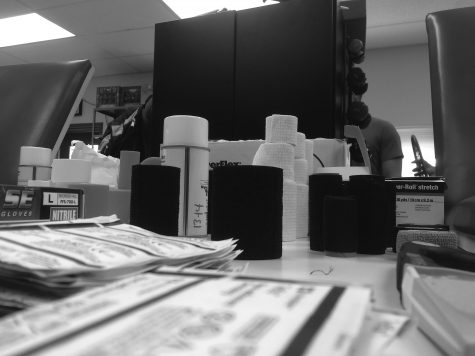Underfunded Athletic Training
Athletic training program self-funds
November 22, 2016

Wham! A football player takes a hard blow to his leg. Laying on the gridiron, he grunts in pain and the trainers rush toward him to evaluate the situation. The referee calls an ‘injury timeout’ and the player is immediately carried off the field with the help of the trainers.
Most people don’t realize that the money that goes toward improving the well-being of student-athletes is raised by the trainers themselves, without any assistance from FCPS.
“We don’t receive any money from [the] county,” head athletic trainer Mike Tierney said.
The athletic trainers raise the budget for the year through its annual physical nights. McLean raises around $7,500 during these physical nights by charging a $50 fee per person to conduct the physical exam required to participate in school sports. It is enough money to buy both expensive equipment and everyday essentials, such as bandages. However, some schools are not capable of raising as much money.
“Not every school is going to have 150 kids showing up [at a physical night], like Mount Vernon, they tend to have lower numbers,” Tierney said.
This lack of funding available to the athletic training program only causes harm to student-athletes. Without the self-funding that McLean trainers conduct, the program would not be able to buy the necessary tools, equipment, or even bandages needed to care for student athletes.
This would directly affect the safety and wellbeing of student-athletes. Without these essential resources the trainers cannot aid the players in their recovery, and injured athletes would not be able to conduct rehabilitation exercises needed for a proper and timely recovery.
“Recently I worked with the trainer for a head injury,” varsity volleyball co-captain senior Natalie Luu said. “I took the concussion test and since my scores dropped I had take part in the five-day concussion protocol Every day I was able to do more activity which helped my head heal.”
“The most recent large purchase is the water tank,” Tierney said. “It was expensive…around two grand.”
The water tank is vital for preventing players from becoming dehydrated during practice. For example, football practices that last for six hours during the summer can cause severe dehydration when players are not drinking enough water.
Although McLean raised enough money to buy such expensive, but essential equipment, the schools that lack funding are not able to buy such equipment, exposing their student-athletes to greater dangers and risks.
“Before I started working here, the school used to get a small fund from the county,” Tierney said.
Funding was halted in 2008. Before schools started physical nights, each school got around $2,000 in funding for their athletic training program. Although this amount may seem insignificant, for the schools that lack funding, every penny is essential.


